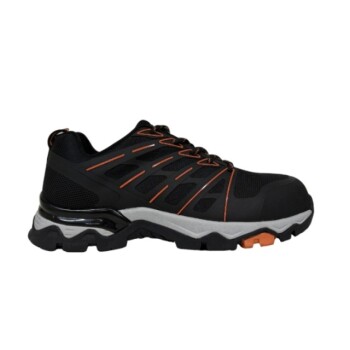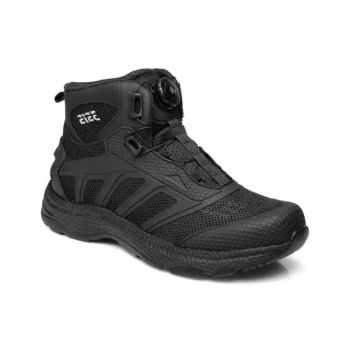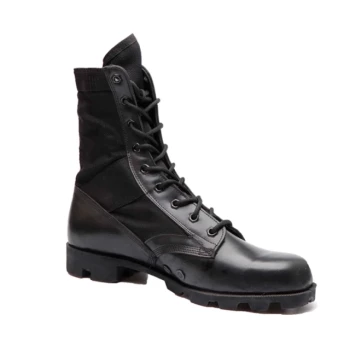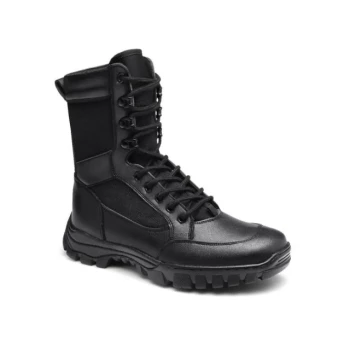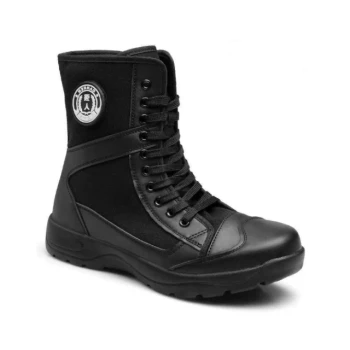In short, natural rubber is the superior material for Wellington boots. It offers an unmatched combination of flexibility for comfort, complete waterproofing, and impressive durability against wear and tear. This makes it ideal for a boot that needs to be both comfortable for long periods and tough enough for demanding environments.
The core reason to choose natural rubber is its unique molecular structure, which delivers practical performance benefits—like comfort, grip, and resilience—that synthetic materials struggle to replicate, all while being a more sustainable choice.
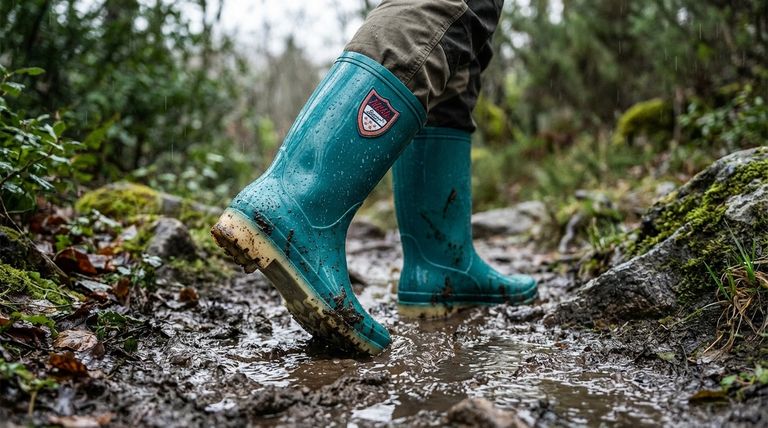
Why Material Choice Defines the Boot
When you buy a Wellington boot, you're not just buying a shape; you're investing in the material it's made from. The choice of material dictates everything from how the boot feels on your foot to how long it will last.
The Advantage of Flexibility and Comfort
Natural rubber's inherent elasticity is its standout feature. This allows the boot to flex naturally with your foot's movement, providing a level of comfort that rigid, synthetic materials cannot match.
This flexibility also means the rubber can be molded into more ergonomic shapes, resulting in a better, more supportive fit around your foot and calf.
Uncompromised Waterproofing and Durability
The primary function of a Wellington boot is to keep your feet dry. Natural rubber is inherently waterproof, providing a reliable barrier against water and mud.
High-quality boots use vulcanized rubber, a process that strengthens the material, making it significantly more durable, flexible, and resistant to splitting or cracking over time.
Superior Grip and Traction
The composition of natural rubber provides excellent grip and traction. This is a critical safety and performance feature, especially when navigating wet, muddy, or slippery terrains.
The material's ability to remain pliable in colder temperatures helps it maintain its grip, whereas some synthetic materials can stiffen and become less effective.
Understanding the Trade-offs: Natural vs. Synthetic
While natural rubber is a premium material, it's important to understand how it compares to common synthetic alternatives like PVC or other synthetic rubbers.
Performance and Feel
Synthetic rubbers are derived from petrochemicals and, while often cheaper, they typically lack the comfort and flexibility of their natural counterpart. They can feel stiff and are more prone to cracking with age and temperature changes.
Natural rubber, by contrast, offers better temperature resistance and a softer feel, contributing to all-day comfort.
Breathability and Foot Health
A surprising benefit of natural rubber is its porous structure. This allows for a degree of air circulation that helps reduce moisture and heat build-up inside the boot.
This "breathability" helps keep your feet drier and more comfortable, reducing the risk of odors or fungal issues that are more common in non-breathable synthetic boots.
Environmental Impact
Natural rubber is a renewable resource, harvested as latex from rubber trees. It is also biodegradable, meaning it will break down over time after being discarded.
Synthetic rubbers are petroleum-based, making them a non-renewable resource. They are also non-biodegradable, contributing to long-term landfill waste.
Making the Right Choice for Your Goal
The ideal boot depends entirely on what you value most in terms of performance, comfort, and longevity.
- If your primary focus is maximum comfort and frequent use: Choose natural rubber for its superior flexibility and better fit, which prevents fatigue during long walks or workdays.
- If your primary focus is durability and long-term value: Invest in vulcanized natural rubber, as it offers the best resistance to wear, tear, and cracking.
- If your primary focus is performance in slippery conditions: Natural rubber provides a clear advantage with its superior grip and traction on varied or wet terrain.
- If your primary focus is environmental sustainability: Natural rubber is the definitive choice due to its renewable and biodegradable properties.
Ultimately, choosing natural rubber is an investment in a higher-performing, more comfortable, and more sustainable piece of essential footwear.
Summary Table:
| Benefit | Natural Rubber | Synthetic Alternative |
|---|---|---|
| Flexibility & Comfort | High, molds to foot for all-day comfort | Often stiff and rigid |
| Waterproofing | Inherently waterproof, reinforced by vulcanization | Varies, can be prone to cracking |
| Durability | Excellent, especially when vulcanized | Less resistant to wear and temperature changes |
| Traction & Grip | Superior grip on wet/slippery surfaces | Can stiffen in cold, reducing effectiveness |
| Breathability | Porous structure reduces moisture build-up | Typically non-breathable |
| Environmental Impact | Renewable, biodegradable resource | Petroleum-based, non-biodegradable |
Ready to Source Premium Natural Rubber Wellington Boots?
As a large-scale manufacturer, 3515 produces a comprehensive range of high-performance footwear for distributors, brand owners, and bulk clients. Our production capabilities encompass all types of durable and comfortable shoes and boots, including top-tier Wellington boots made from superior natural rubber.
Partner with us to provide your customers with boots that deliver:
- Unmatched Comfort: For long workdays or outdoor activities.
- Proven Durability: Built to last in demanding conditions.
- Superior Performance: Excellent grip and reliable waterproofing.
- Sustainable Choice: Meet the growing demand for eco-friendly products.
Contact our team today to discuss your bulk order requirements and how we can help you build a successful footwear line.
Visual Guide
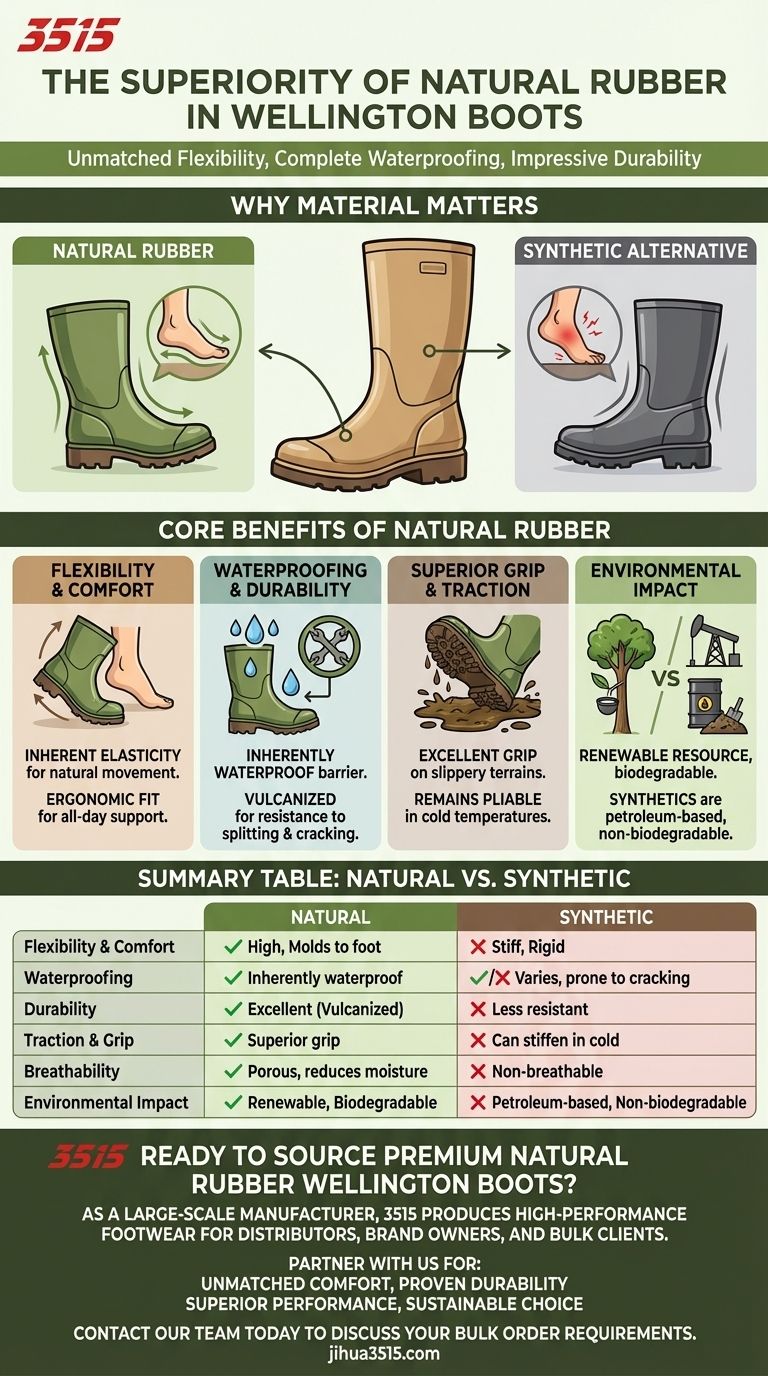
Related Products
- Factory Direct Wholesale Rain Boots Durable Waterproof & Fully Customizable
- Factory-Direct Wholesale Canvas Boots with High-Traction Rubber Soles
- Wholesale Waterproof Tactical Boots Custom Suede & High-Traction Soles
- Premium KPU Injection Athletic Style Safety Shoes
- Wholesale Safety Footwear Manufacturer for Bulk & Custom OEM Orders
People Also Ask
- What causes white marks on rubber boots, and how can they be removed? A Guide to 'Blooming' & Boot Care
- Do wellies stretch over time? The Truth About Rubber Boot Fit & Comfort
- What features of wellington boots help prevent slips? The Science of Grip in Slippery Conditions
- How should you clean the inside of rubber boots? Eliminate Odors & Extend Boot Life
- What are the benefits of short ankle Wellington boots? Lightweight, Versatile & All-Day Comfort
- What are the Euro and UK size conversions for children's wellington boots? Get the Perfect Fit Guide
- Are wellies bad for babies and toddlers' feet? A Guide to Safe, Healthy Footwear
- Which UK brands are committed to sustainable Wellington boot production? Look for the FSC Certification.



